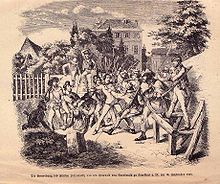Felix Lichnowsky: Difference between revisions
No edit summary |
|||
| Line 19: | Line 19: | ||
[[Category:Germans of Czech descent]] |
[[Category:Germans of Czech descent]] |
||
[[Category:Germans of Austrian descent]] |
[[Category:Germans of Austrian descent]] |
||
[[Category:People from Opava District]] |
|||
[[Category:1814 births]] |
[[Category:1814 births]] |
||
[[Category:1848 deaths]] |
[[Category:1848 deaths]] |
||
| Line 25: | Line 26: | ||
{{Germany-hist-stub}} |
{{Germany-hist-stub}} |
||
{{Austria-hist-stub}} |
{{Austria-hist-stub}} |
||
{{Czech-hist-stub}} |
|||
[[de:Felix von Lichnowsky]] |
[[de:Felix von Lichnowsky]] |
||
Revision as of 03:21, 5 December 2009
You can help expand this article with text translated from the corresponding article in German. Click [show] for important translation instructions.
|
This article relies largely or entirely on a single source. (December 2008) |


Felix (von) Lichnowsky, fully Felix Maria Vincenz Andreas Fürst von Lichnowsky, Graf von Werdenberg (Template:Lang-es; April 5, 1814, Schloss Grätz, Hradec nad Moravicí, nearby Opava - September 19, 1848) was a son of the historian Eduard Lichnowsky who had written a history of the Habsburg family.
He entered the Prussian army in 1834, but left it in 1838 to enter the service of the Spanish pretender Don Carlos, where he received the rank of brigadier general. He fought a duel with the Spanish General Montenegro and was severely wounded, but recovered. In 1847, he was elected by Ratibor to Prussia's United Diet, and was elected to the national parliament in 1848 where he took his seat on the right. Here he put to use his substantial oratorical skills, though frequently using them to dazzle rather than enlighten, and his demeaning characterizations of the left earned him a poor reputation in those quarters. When the uprising broke out on September 18 in consequence of the parliament's decision regarding the truce of Malmö (in the debate for which Lichnowsky had spoken in very conciliatory terms), disdaining all warnings, he rode out with General von Auerswald to meet the troops arriving from Württemberg. A mob recognized them on the Bornheimer Highway and gave chase to the defenseless men. They fled, but accidentally went down a dead-end path at the end of which they dismounted and hid in a gardener's hut. The mob found them in the hut, shot von Auerswald to death and beat up Lichnowsky who died the next day in Baron Bethmann's villa.
References
- Franz Freiherr von Sommaruga, “Lichnowski, Felix” in Allgemeine Deutsche Biographie, Band 18 (Leipzig, 1883), S. 533-534. Template:De icon
